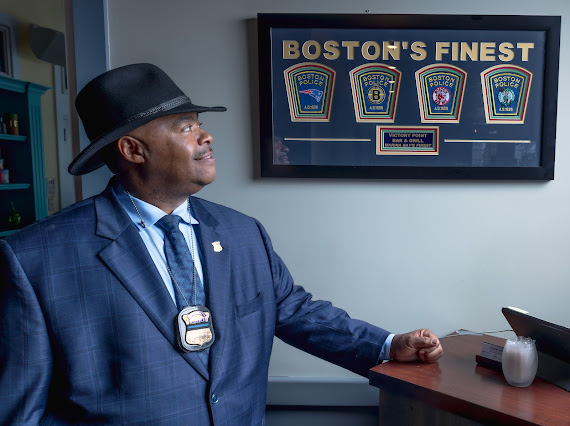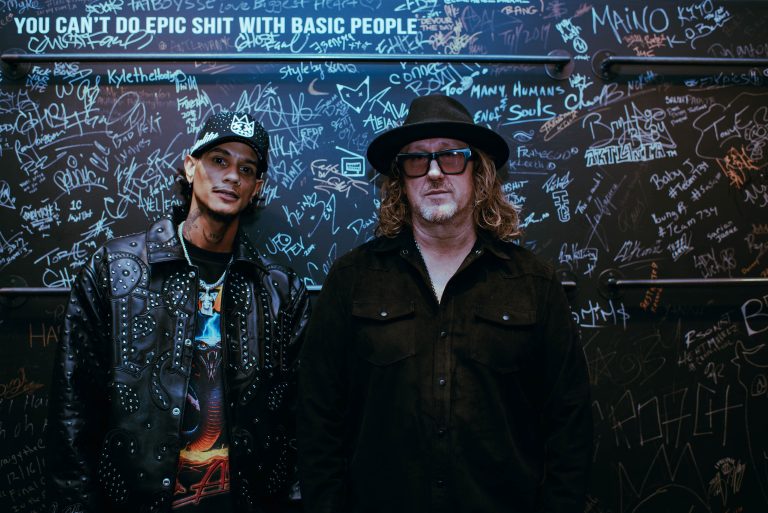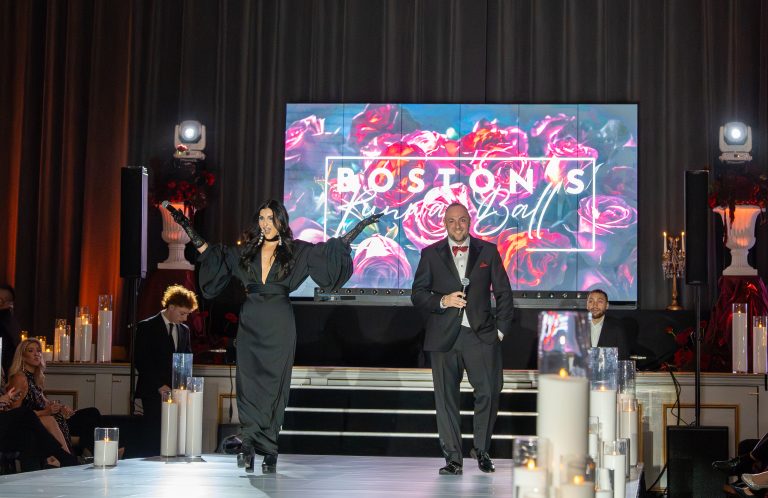Retired from public service since 2021, former Boston Police Commish, William G. Gross, remains a symbol of the trademark values he represented for almost 40 years wearing the badge in Boston: community, justice, and hope.
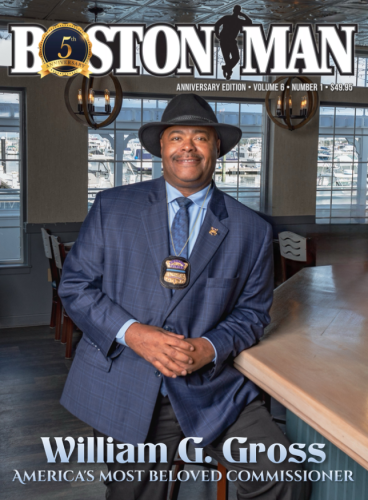
WITH his trademark fedora, wide smile and larger-than-life persona, former Boston Police Commissioner William G. Gross may be gone from the ranks of the department, but he remains a fixture in the Dorchester neighborhood where he was raised.
Gross had a meteoric rise to the top of the Boston Police Department, becoming the city’s first-ever African-American police chief and commissioner. He steered the agency through post-George Floyd rioting, including a terrifying night of looting and chaos that stands as one of the city’s darkest hours. The spotlight was at times harsh, especially leading the department through post-Covid turbulence, the fentanyl and homeless epidemics, and unprecedented political upheaval.
Through it all, he remained the people’s commissioner and earned so much goodwill across the political spectrum that his name was floated as a possible mayoral candidate.
“I put in 90 to 100 hours a week,” he recalls of the commissioner’s job in a recent interview. “For me, it’s definitely a pay-it-forward position. I was very well known for being in the community and being right out there with the troops.”
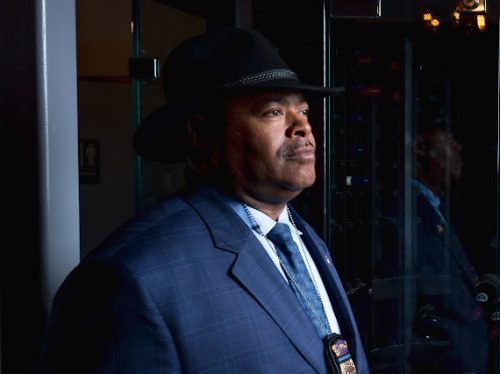
When Gross’ name was floated on WBZ Radio’s “Nightside” with Dan Rea as a possible mayoral candidate in 2021, momentum quickly built behind him. Many thought Gross’ calm demeanor, approachable style and law-and-order background, as well as his political outsider status, made him a viable mayoral candidate. He quickly withdrew his name from consideration, however, and backed former City Councilor Anissa Essaibi-George, who hails from Gross’ Dorchester neighborhood.
The rest is history as Mayor Michelle Wu won and Gross’ moment in the political spotlight ended as quickly as it began. For Gross, being commissioner or even a mayoral candidate were not goals he had in mind. He says he never asked for a single promotion throughout his career at BPD, but rather was selected, often at the urging of people in the department who appreciated his work ethic and no-nonsense style.
It’s a characteristic he inherited growing up the son of a single mom on a rural farm outside of Baltimore. His journey from a young hand on that small pig farm in Hillsborough, Maryland, to becoming the top law enforcement official in Boston, is truly an inspiring American tale.
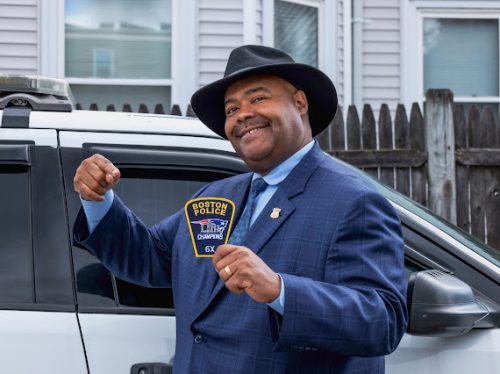
He, his two sisters and their mother struggled when Gross was young and the family was welcomed to live on the farm by its owner, Robenia Frame, who was a close friend of Gross’ mother, Deanna.
“Like many single mothers, my mother was struggling and this lady took her in. Miss Frame helped to raise me and my sisters,” he says. “I always called her grandma. It was family always looking out for each other.”
While his father was never a part of his life, he recalls many uncles and male family friends on the farm who helped shape him as a young man, including several who were Vietnam veterans. Watching the soldiers coming back from Vietnam being mistreated was upsetting to young Willie as the vets that he knew were good people who served honorably.
“I never understood why the college kids were spitting on the soldiers. They didn’t have to go because they were rich. It was all the poor white and Black kids who went,” he says. “That factors into developing my personality. The soldiers back then were the underdogs so I always stand up for the underdogs.”
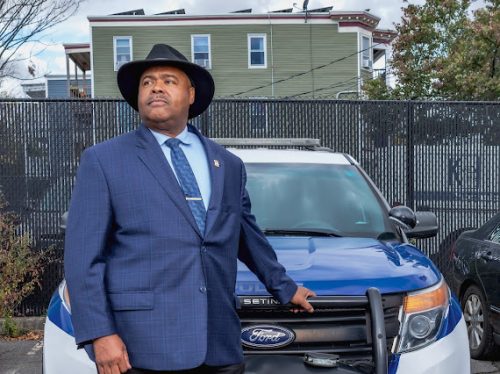
In search of more opportunity, Willie’s mother and sister moved to Dorchester where his mother took a position as a supervisor for Sears department stores. They lived on Esmont Street in a rugged stretch of Dorchester. A few years later, Willie joined them and quickly had to learn the ropes of a racially divided city that had been torn apart by the forced busing crisis.
“I was 12 years old. I was a goofy country kid,” he jokes. “Country mouse comes to the city at the height of forced busing.”
His mother quickly educated him about neighborhoods to avoid because of the racial strife.
“She told me, ‘You can’t go to South Boston, you can’t go to Hyde Park, you can’t go to Charlestown,’” he says. “I was like, why not? The city was in racial turmoil. Me being so green, thankfully, people looked out for me.”
He went to Oliver Wendell Holmes School and immersed himself in history books. He had a male history teacher who pushed him hard to prepare him for the exam school test. The hard work paid off as Gross passed the exam and was admitted to Boston Technical High School.
He took the Air Force exam and passed, and also took the BPD exam. He was committed to serving in the military, but the BPD came calling first so he entered the department’s cadet program in 1983, officially becoming an officer in 1985.
“I always loved law enforcement,” he says, recalling watching iconic 70s cop dramas like “Mod Squad” and “The Rookies.” “I was just raised around shows with law enforcement and important discussions about current events, race, how Black people were treated, how underdogs were treated.”
“The attitude when I got to Boston was what I was taught from the farm: if you want to do something, you can do it. If you want change, be the change. I got a great sense of morals from my old country life,” he adds.
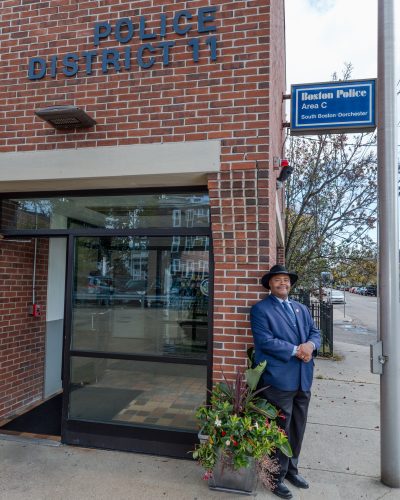
While the city and the nation reeled from racial tension, Gross brought an everyman approach to the job.
“The city was beefing, racially. I came onto the department like ‘I’m not going to take crap from anybody.’ I soon learned if you’re a crappy person you’re a crappy person. It doesn’t matter your color,” he says.
As a cadet, he explored the city, going into the neighborhoods his mother had warned him against. He went into South Boston, predominantly white neighborhoods in Dorchester and Hyde Park. He gravitated toward seniors in all the communities where he worked, finding that they provided perspective, historical context and pride in their neighborhood.
“What you find out is that you have more in common than not. Everyone wants the same things – quality of life,” he says.
He rose through the ranks. He worked in Charlestown, the North End, East Boston and Chinatown. Eventually, he was assigned to C-11 in Dorchester. The department then was mired in a culture of nepotism, favoritism, politics and racism. But many of the older Black officers and many white Irish cops took a liking to Gross because of his strong work ethic and commitment to justice.
“Some people mentored me and looked out for me because I was a worker,” he says. “The highest compliment you can get in law enforcement is that you’re a worker.”
He became a detective sergeant in 1985 and later went to the gang unit and then a drug unit. Under former Commissioner Ed Davis, he was promoted to deputy chief.
Davis told him he “came highly recommended.”
“I said guys like me don’t get a shot at deputy. I’m not in politics. I call ‘em like I see ‘em and I don’t have any relatives on the job,” he recalls telling Davis. “I said, ‘I’m not going to be that guy to shit on the troops or shit on the community. I’m a frontline guy. I stick up for the troops and support the community.’”
In 2018, he was named commissioner by the appointing mayor, Martin J. Walsh, a fellow Dorchester resident.
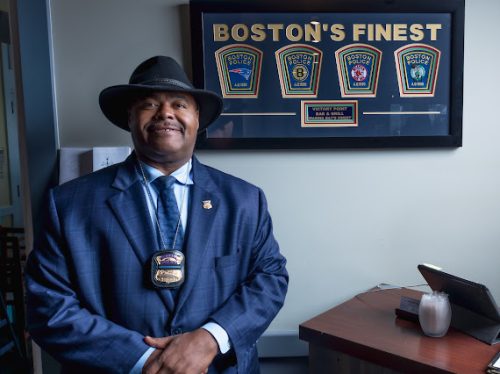
He maintained his community policing and relationship-building approach to law enforcement and was a regular at neighborhood block parties, youth sports games and community events. When protests enveloped the city following the murder of George Floyd, Gross was at many of the demonstrations and made sure his officers respected the First Amendment but kept the peace as much as possible.
“My troops were right there marching with the protesters. I would often speak with the protesters,” he says. “If you compare Boston, we respect the people to exercise their First Amendment rights, but not with the ignorance of destruction. If you start burning things up and destroying things, that’s all you’re going to be remembered for.”
On the May night in 2020 when cars were torched and businesses in the Back Bay were looted and destroyed, he says the community supported the department’s efforts to contain the chaos.
“That lasted one night. We said, ‘Not here. You’re not burning down Boston,’” he says. “We had full support from the community. Boston’s tough. We stick together.”
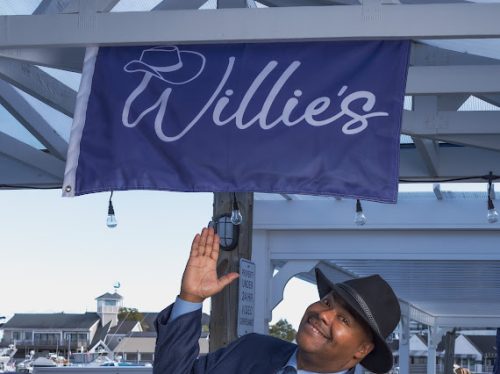
These days, Gross is retired, doing some consulting for a police body camera company and volunteers on several boards, including the Special Olympics, the American Red Cross and the Board of Missing and Exploited Children. He’s a jazz aficionado and still enjoys frequenting block parties in his old Dorchester neighborhood.
He got married last year and loves being “G-Pop” to his three grandsons, all of whom love to wear fedoras just like their grandfather.
“How do you go from living on a pig farm to being commissioner?” he wonders. “I’m so lucky I had so many people looking out for me.”
Dave Wedge is a New York Times bestselling author and writer based in Boston.

